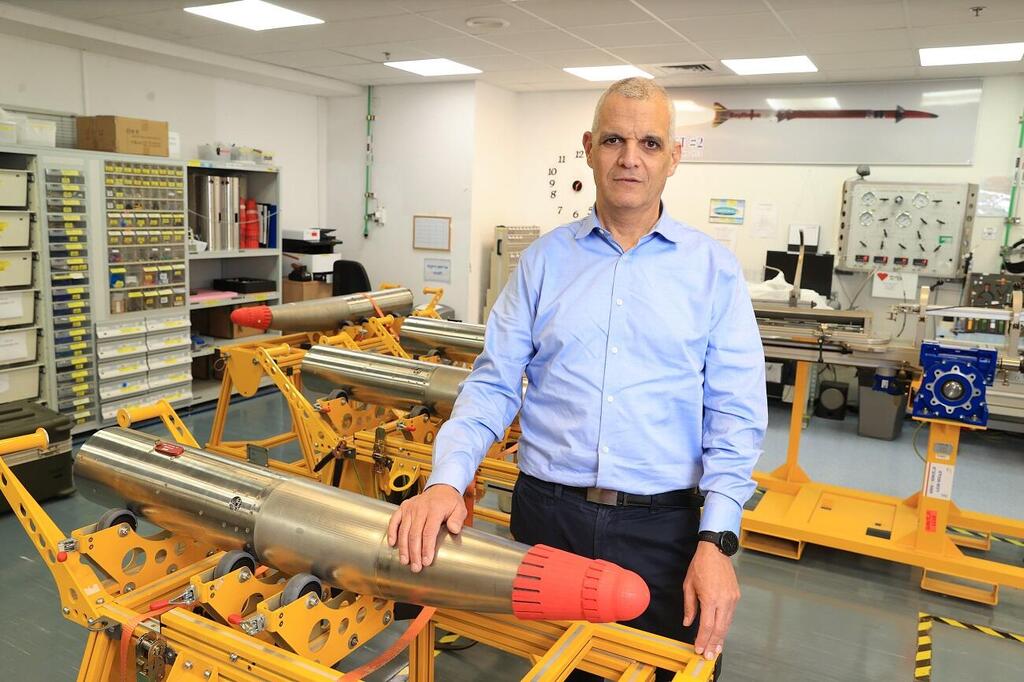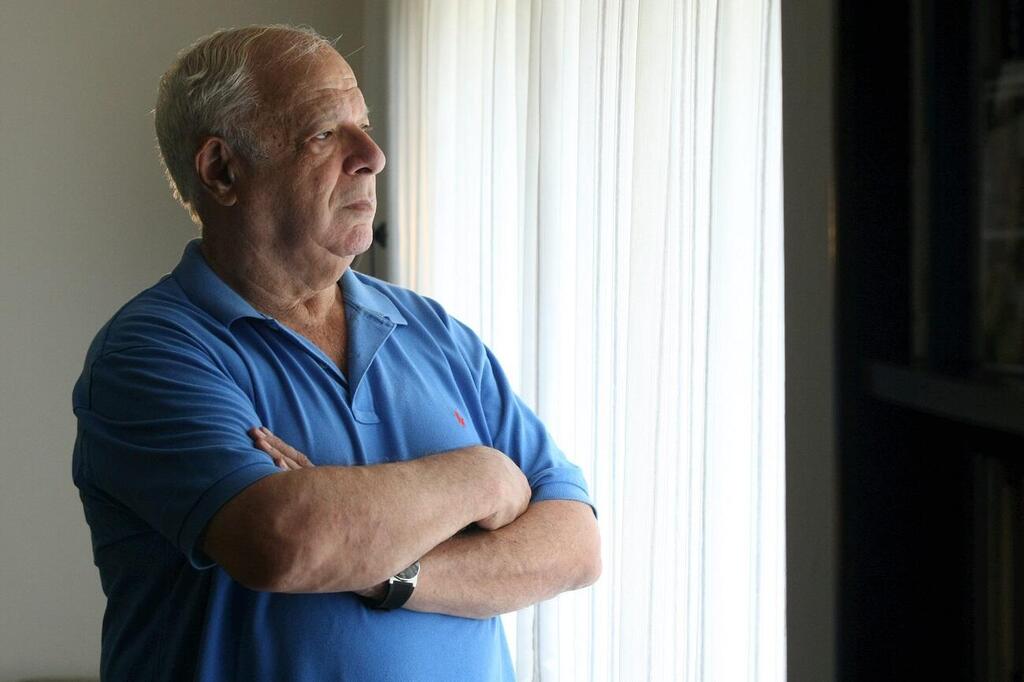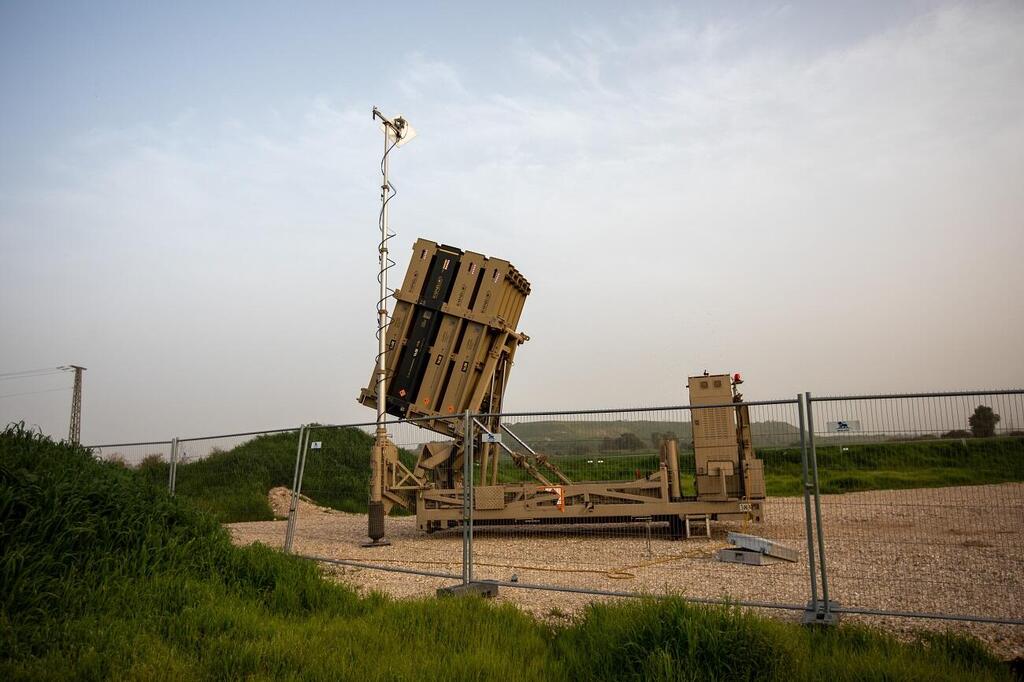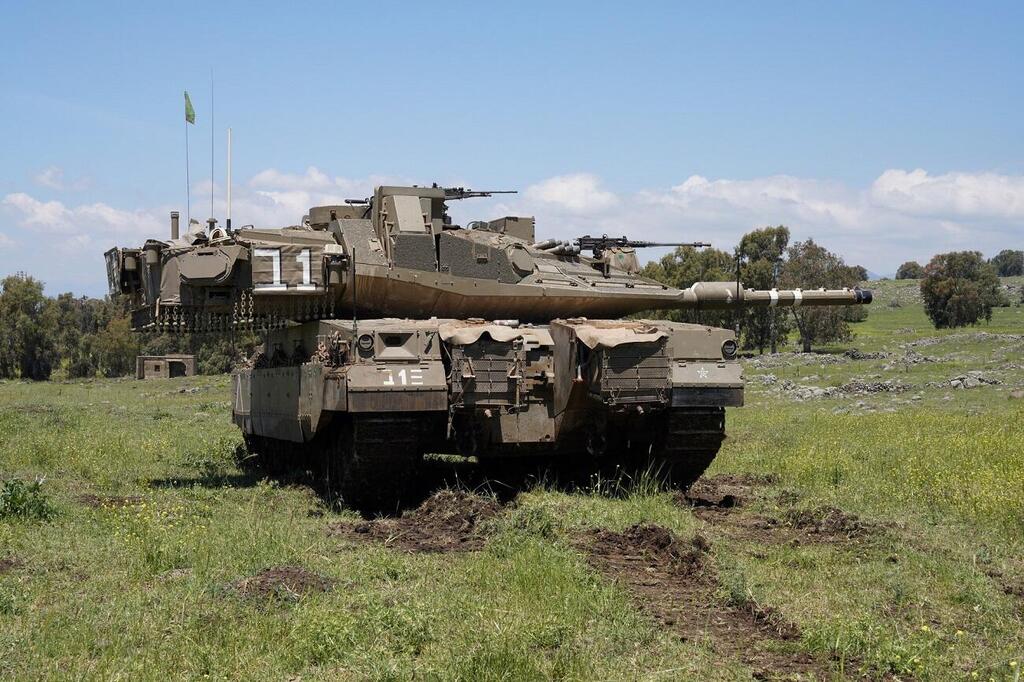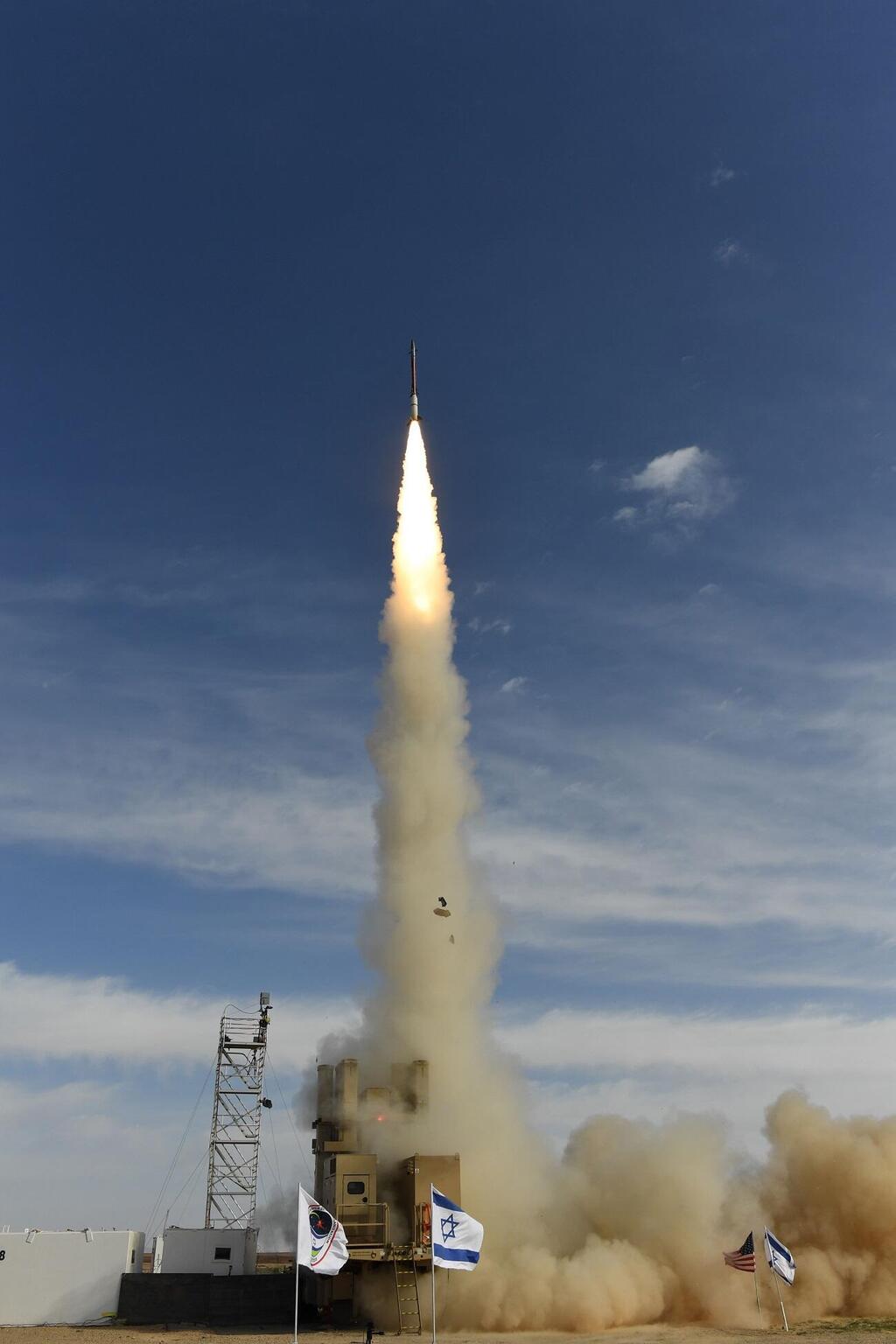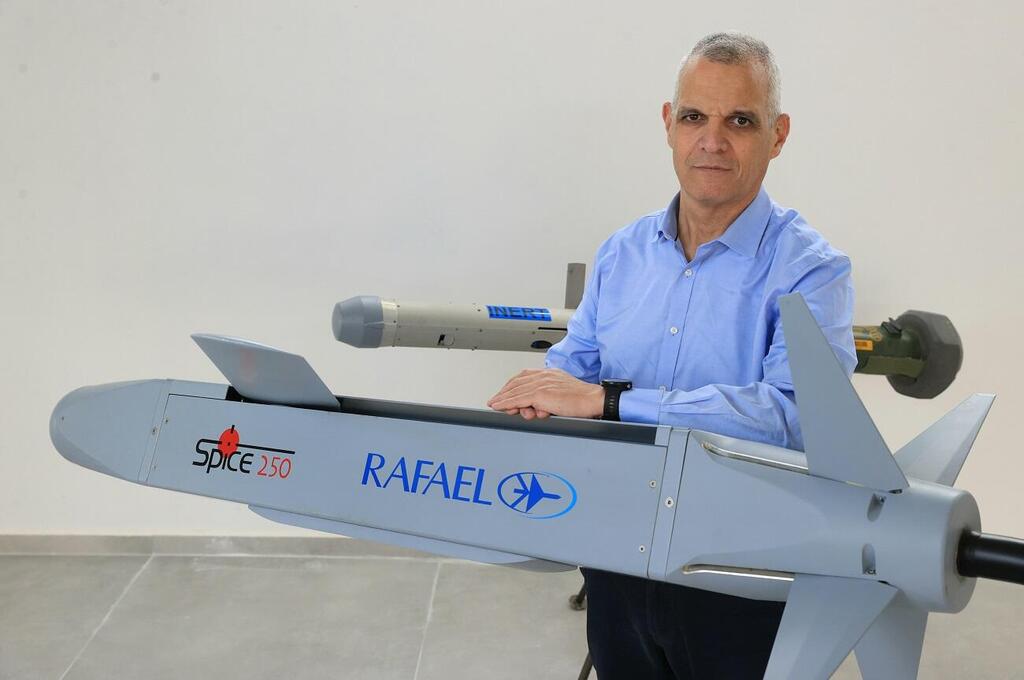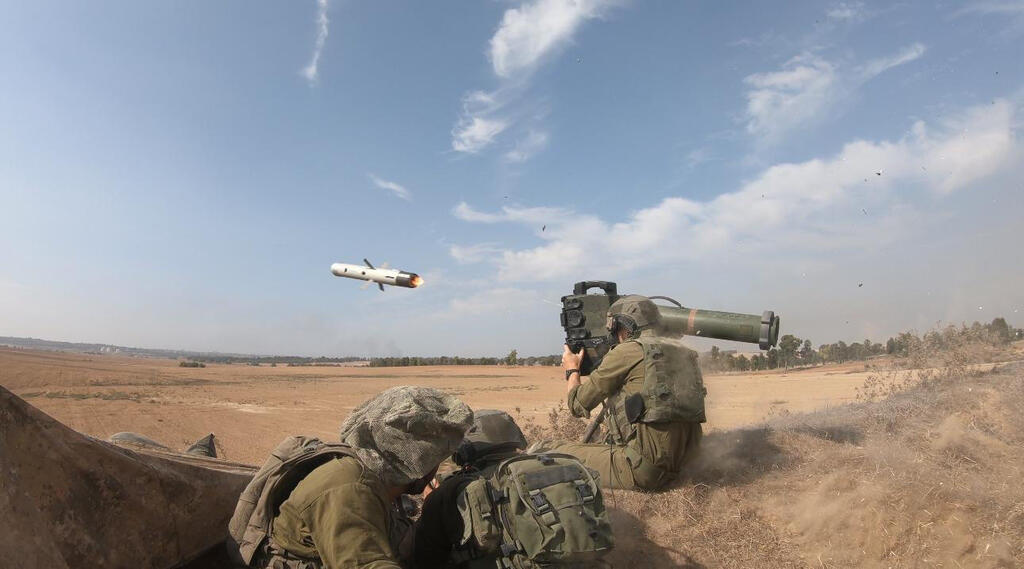The meeting with Rafael CEO Yoav Har-Even, who’s retiring after eight years on the job, was held, at his request, at 8 am in Tel Aviv after he had arrived from his home in Jerusalem at 7 am, parked his car in the Yarkon Park and ran to his office for an hour in the pouring rain.
Read more:
It’s not widely known, but Rafael which has been operating from the Krayot in northern Israel since its foundation, also has seven-story offices in the luxurious Hagag Towers on Tel Aviv's Ha’Arbaa St. that employs 300 engineers and developers. This is where Har-Even’s office is situated.
Har-Even, who pioneered the Tel Aviv branch, insisted on showing me the upper, 35-36th, floors with their surprising design that would put Google (on the 22nd floor) to shame. There are coffee machines, a cafeteria facing a huge sea-view window, graffiti scribbled by employees on partition panels, workers’ pets and everything you wouldn’t expect out of a government company founded in 1948.
During the hi-tech recruitment peak, as many Rafael employees left the company, Har-Even realized that the Krayot wasn’t exactly the most attractive site for talent from central Israel, nor could it compete with start-ups on Tel Aviv's famous Rothschild Boulevard or Google and Facebook offices in the high-rise towers in the big city. He took them on on their own turf, opening a branch in Tel Aviv. And not just any branch, a branch in the glittery towers.
Rafael Advanced Defense Systems ranks alongside Israel Aerospace Industries (IAI) and Elbit as one of the most successful and profitable government companies and can sign off on a formidable list of advanced defense systems such as the Iron Dome (short- to mid-range air defense system), Trophy (military armored vehicle active protection system) and David’s Sling (mid- to long-range air defense system).
During his tenure as CEO, as defense industries ride the wave of crazy-high world demand for armaments - and especially since the war in Ukraine - the company’s order backlog has reached an all-time high. In the first three quarters of 2023, the company received orders totaling NIS 15.3 billion ($4.3 billion) – an increase of 48% from the corresponding period in 2022. This backlog has increased by 32% to NIS 43.6 billion ($12.9).
Sales turnover reached NIS 9.5 billion ($2.7 billion), up - 22% from the previous year. Since Har-Even took up the position eight years ago, company sales have increased by 75% and 22 further subsidiary companies have been acquired worldwide at an investment of NIS 1.7 billion ($476 million).
'I believe IDF chief will probe October 7 failures'
Maj. Gen. (ret.) Har-Even, 57, married and father of three who served as head of the IDF Operations Directorate, was born in Ramat Gan and attended Blich High School. “I’ve been in the army ever since graduating high school in 1984. That’s 31 years, despite my father being against an army career for me," he says.
His father was a space specialist, 1977 Israel Defense Prize recipient, Prof. Aby Har-Even who served as director-general of the Israeli Space Agency (1995-2004) and was murdered on June 7, 2021, during Operation Guardian of the Walls. Arab rioters set fire to the Effendi Hotel in Akko where Prof. Har-Even was staying.
Har-Even Jr. served as head of the IDF Operations Directorate during Operation Pillar of Defense in Gaza in 2012 as well as during the 2014 Operation Protective Edge and is famously media-shy.
“I haven’t given an interview since 2014 when I left my role as head of the Operations Directorate,” he says. “You won’t see me commenting on TV show panels. I agreed to this interview marking eight years as Rafael CEO – the best job I’ve ever had and ever will.”
His appointment as CEO of energy company, Generation Capital-owned PowerGen, which produces, stores and supplies electricity was recently. Replacing him as Rafael CEO is Yoav Tourgeman who joined the ranks of Rafael following four years as CEO of IAI’s subsidiary company, ELTA.
IDF Chief of Staff Lt. Gen. Herzi Halevi recently appointed Har-Even (by Tsav 8, Israel’s emergency reserve duty call-up notice) as a member of the IDF’s internal investigation team into the events of the morning of October 7.
On the morning of our interview, the cover story of Ynet News' sister publication Yedioth Ahronoth revealed that the politicians managed to block the chief of staff’s initiative. Har-Even’s facial expression along with the concise answer he’s willing to give, tell us what he thinks of the decision.
Why does the chief of staff even need external approval for an internal investigation?
Har-Even: “He really doesn’t need approval for this, and I’m not sure anyone’s holding it up. I believe the chief of staff will interrogate, as it’s always been in the IDF.”
What does the October 7 failure tell us about military technology?
“The failure on October 7 is not the result of technological failure. Further investigations will be needed regarding operational and intelligence matters, but as for the systems developed by Rafael, the war has proven that we went in the right direction. All our systems are operational during the war. The things we’ve developed over the years serve precisely the multi-layered defense concept. This includes David’s Sling and Iron Dome, providing the home front with almost complete protection. They’ve been at their highest operational use during the war. There’s also the Arrow anti-ballistic missile system that’s used against the Houthis."
If a concerned citizen were to ask: According to the Home Front Command scenario, Hezbollah attacks with precision using large clusters of 600-pound warheads continuously for several days. Iron Dome has already been challenged when Gaza fired a large barrage. Are we really well protected? Can we sleep peacefully at night?
“I sleep soundly, but that’s not clever. I sleep well even when a close family member is serving in Khan Younis. I was once asked how I sleep at night. I just said that I go to sleep in the evening and get up in the morning. I can do this because I know we’re providing the IDF with maximum capabilities. However, I sleep less soundly as I see the threat against the State of Israel developing. What happened in October only reinforces my feeling that we have to do much better.”
“As for the home front defense against missiles: technologically, we know how to deal with barrages, but the IDF must weigh up what and how much to defend. Armaments also have their economy. The problem is that, in the end, the debate usually veers to the salaries of permanent personnel and their part in the defense budget (NIS 30 billion ($8.4 billion) out of a defense budget of NIS 63 billion ($17.64 billion)). The IDF decides what it defends more. The more massive the fire, the more deployments are needed.
"I repeat: The tools allow us to address the missiles. The question is how many there are, how many systems the IDF decides to purchase, and how many armaments are stockpiled. The IDF should say if it has enough. So, I’m not qualified to answer the question as to whether we’re well protected. I’ll certainly not say how many defense systems the IDF has and whether or not more are needed. I can say that Iron Dome was initially intended for short-term threats, and it can presently address most of the threats from Lebanon. It will remain the main workhorse, including against Hezbollah. Above Iron Dome is David's Sling, protecting us from threats from further away. Above David’s Sling is the Arrow.“
"Israel is the most protected country in the world against rocket fire. No other country has these capabilities – everything from detection and warning using radars and electro-optical sensors, through the multi-layered defense. Look at what’s happening in Ukraine. The home front isn’t protected there. This isn’t the case in Israel. The problem on October 7 wasn’t technology. The debate is about the IDF’s defense concept.”
Despite the Trophy system, anti-tank missiles do hit tanks and AFVs. Learning lessons from the war, are you developing a new generation?
"The Trophy system saves hundreds of fighters in Gaza, and is installed in both Merkava 4 tanks and Namer APCs. We realized too late that it’s not providing 100% protection, and anti-tank missiles and RPGs are hitting the vehicles. Every system has its soft spots. Data shows that very few vehicles installed with the Trophy were damaged. The interception rate is also high in AFVs not equipped with the Trophy where protection in the form of plates developed by Rafael is installed.”
“Our teams meet with the IDF during the fighting. Every incident where the system is activated is recorded and we investigate it and improve it, updating software versions – all this as the fighting is in progress. The Trophy is the world’s only system that’s operational. The Americans, Germans, British and even the Norwegians have bought it. We’re already asking ourselves what the next generation will look like. It’ll still be based on the same interception concept, but will be able to provide defense from emerging threats of attacks from above such as drones. We’re not talking about dramatic improvements. We don’t need to invent a new system.”
Which defense systems are expected to be revolutionized?
“Missile defense systems. Iron Beam will be operational by 2025. The IDF already has a system, but it’s not yet operational. The British proudly announced this week that they’d intercepted a coin from a distance of almost a mile. We intercepted a ten-shekel coin two years ago from a distance of 7 miles. Our Iron Beam is the most advanced system in the world. It’ll allow us to increase Israel’s interception solutions and deal with all kinds of threats such as UAVs, drones, short and mid-range rockets. The IDF will have batteries deployed with all types of defense systems and we’ll be able to choose what to use.
"The Iron Beam will also let us significantly reduce interception costs. It’ll complement, not completely replace, Iron Dome. Interception costs will be reduced by around 80%. Each Iron Dome interception costs $100,000. With Iron Beam, the main expense will be purchasing the launching pad, but it’s infinite after purchasing, so Iron Beam is free. In its initial stage, it’ll intercept up to 7 miles but the range will increase.”
Some say that the IDF wasn’t prepared enough for the threats coming from drones and tunnels. Are you active on this front?
“The drone threat comes as no surprise. We knew it existed and, at Rafael, we’ve been addressing it for years. We have dozens of defense systems against drones that are operational in foreign armies. Rafael’s Drone Dome system is designed to address the threat of drones at a distance of around two miles and it also decides whether to take down a drone – usually via disruption. The IDF has bought these systems too. The question is whether we’ve deployed them for use. Are they being activated correctly?
“Since the war in Ukraine started, we realized there would be threats from drones and UAVs. On October 7, the volume of drones and paragliders Hamas launched against us was enormous. We had a technological response to everything. The main problem was the element of surprise compounded by their infiltration’s broad deployment. So, the problem on October 7 is about perception and concerns IDF readiness. This is one of the things the IDF needs to investigate.”
“As for the tunnels: We operate by discovering, locating and addressing the tunnels. During Operation Protective Edge, they also fought in the tunnels and not just from above. I can't get into that. We’re supporting the IDF in the challenge, and the war isn’t over yet. The IDF won’t necessarily become a tunnel army, and it’s not clear that we have to deal with all of them”
It was announced that the IDF has completed a successful test of the SPYDER air defense system. What will this be used for?
“We’ve sold this system all over the world, and the IDF decided it doesn’t need it. Until October 7, the IDF thought that the main threat was from rockets and missiles. The war has taught us that the IDF needs more defense systems against everything that flies fast. Until now, the IDF has been fighting the Houthis with fast air-to-air missiles that need to keep a plane in the air at all times. The SPYDER system 'dropped' the air-to-air missiles from use from the ground, and there’s no need for a plane. That's a huge saving.”
'We rely on the Americans, period'
It’s not just Rafael breaking sales records over the past year: In the first three quarters of 2023 Elbit, employing 14,000 people in Israel, boasted sales of NIS 21.8 billion ($6.1 billion) and accumulated orders of NIS 60 billion ($16.8 billion). IAI, with 15,000 workers, sold products to a value of NIS 18.5 billion ($5.18 billion) in the three quarters of 2023, with a NIS 61.4 billion ($17.2 billion) backlog of orders. One may assume that this trend won’t stop anytime soon.
What is the challenge in preparing for the battlefield of the future?
Har-Even: ”Man will always be the dominant factor on the battlefield, even in the future. At the end of the day, it’s people who win wars. Broadly speaking, we’re striving to reduce the soldiers’ friction with the enemy. In real-time, we can already disseminate accurate intelligence down to a company fighting in the field, connect that to the Air Force at levels unmatched in the world. Fortunately, today's soldiers can adapt faster to technology than when I was a soldier.
“In the Storm Clouds project, I can take small, unmanned platforms like UAVs, drones and nanosatellites weighing anything from one ounce to over 200 lbs. that fly independently in clusters at an altitude of 20 inches to 400 miles. This means I can operate clusters to roam the skies like clouds of drones operated remotely with no pilot. This makes the person needed to fly them remotely obsolete.
"Storm Clouds will align themselves independently and will have a range of sensors. The commander in the field will mark a spot on the map on his phone or tablet – a square in which he’s going to fight - and receive all the relevant information about his battleground. He won’t need to call the General Staff or the Military Intelligence Directorate for someone to send him satellite pictures from space. It’ll make understanding the battleground and decision-making much easier.”
“There’s a competition with the enemy to be the first to know, understand and take action. There’s a vast amount of information making its way to the field. This is where AI comes in. It’ll enable soldiers to process the information quickly. With the IDF, we’re already developing algorithms that can process data. Just imagine: With Storm Clouds, we’ll be able to identify a guy with an RPG from further away and take him out from further away.
"Hypersonic missiles pose a further threat. They fly very fast, it’s very hard to identify them at low altitudes and even if you have, you need something very fast to attack it. It’s complex. We’re currently developing the Skysonic. We’ve taken our best developers to create an interceptor to address it. This technology is groundbreaking.“
The issue of relying on the Americans keeps coming up. How dependent are we on them?
“We rely on the Americans, period. It's not just about armaments. Israel is now waiting for the special $14 billion aid budget from the U.S. After Guardian of the Walls, the United States gave us a $ 1 billion special aid package, most of which went into Iron Dome. Now, of the $14 billion budget, $4 billion will go to reinforce the David Sling and Iron Dome, and another $1.2 billion is earmarked for Iron Beam and another $4 billion is compensation to the forces that gave the IDF equipment and the rest is for other uses.
"Anyone thinking that we rely on the U.S. only for arms alone is wrong. They also finance those armaments – and that's reason enough to be friends with them. You don't need October 7 to know that we rely on the Americans. The Israeli defense industry manufactures lots of armaments for the IDF in the U.S. because the Americans‘ terms for aid are that, with the aid funds, we manufacture on U.S. soil. We have a plant in Orlando with a $170 million turnover and all its products are intended for Israel. We manufacture 70% of Iron Dome missiles, 60% of air-to-ground missiles and 50% of Trophy systems in the United States. Anyone thinking we could break away from the Americans should consider the price. We’d need an additional NIS 12 billion for defense to replace the aid budget we receive from the U.S".
The IDF is to receive a further NIS 20 billion defense budget due to the war. What will that do to you?
“Of our sales, 50% are earmarked for the IDF and 50% for overseas. In 2023, exports reached 58%. That was before the war. We had an all-time-record year. Our order backlog increased by 32% compared to the previous year, reaching NIS 43 billion. It’s not just about selling and shipping goods to the customer. Everyone today also wants knowledge transfer and local manufacturing. One of our responses has been building our plants at our customers’ location, or in collaboration with their local partners. The IDF has learned from this war that it needs to increase its stocks, so all IDF suppliers will enjoy increased budgets in the coming years.
“Since the war in Ukraine started, global demand has increased to the point that there’s a global armaments shortage. Our anti-tank SPIKE missiles are the most sold in the world. We sell them to 41 countries and we’ve tripled our production lines since 2022. We had prepared to increase our production capabilities regardless of the war – and now we’ll obviously increase that even more.
“In the war, the first thing we asked was what does the IDF need, and provided that at the expense of overseas customers whose supply dates were pushed back. None of our customers across the globe – and there are dozens – insisted on the original supply dates. They understand that we’ll catch up in the coming months. I’ve also encountered no country that stopped buying from Israel because of the war. As the war continues, we keep receiving orders from overseas. Demand is only increasing.
"Our systems are proven in real-time on the battlefield and our customers see how they’re used very well by the IDF. The closeness of the IDF, the Defense Ministry and the defense industries is unique, creating a win-win situation for all parties. Ten percent of our annual turnover is invested in R&D. In 2024, we’ll invest NIS 1 billion ($280 million) in our own R&D.”
You plan to recruit 2,000 people next year. Is it hard to compete for workers with the high-tech industry?
“We’ve increased our workforce by 30% since 2016. Retaining employees isn’t just about salaries. The security of the State of Israel is still a selling point. You have the technological challenge of being the world’s number one, and our salaries are also very respectable. I can’t compete with NIS 1 million signing fees, but we have employees who left Rafael for high-tech, and then came back to us. When you ask them why they returned, they say ‘Because I have an interest here’. During the war, people came here as part of Tsav 8 – people who used to work here and had left for other jobs and just came to help.
“Any morning, our workers in Tel Aviv could choose the building’s 22nd floor where Google and Facebook are based – or any other startup in the Hagag Towers - but they don’t. Of the students who work at Rafael, 60% then choose to carry on working here. And Rafael is a matchmaking factory. Last week, Yedioth published a story about a couple who met here. She is head of the Iron Dome unit and he’s a David’s Sling developer. Although it's a security plant requiring high-security clearance, we let employees bring their children in during the war.”
Why did you decide to move to Generation Capital’s PowerGen?
“I received an offer from the private sector to become part of an exciting and growing field that can improve our economy, so I decided to learn the field and get into it. I chose to do something different, not related to security. I’ll start the job in a few months. I’m sure I’ll be able to contribute.”
The Arab-Israel conflict has taken its toll on you personally. Your father was murdered in riots in Akko. The current war raises the question of whether we’ll always live by the sword.
“We live in a neighborhood where threats will always increase. I don’t see our neighbors joining the Zionist movement. What our enemies want for us is clear. But we’re here to stay. Israel is very strong, even after October 7. It’s an indescribable event, but the IDF has come around since October 9, has shown its strength and is overcoming Hamas. If you ask me, we’ll live by the sword for some time yet. But there’s no solution that’s just military. You can’t solve all the problems in the Middle East by force alone, without a political solution.
"We conquer Gaza, then what? In the meantime, the Europeans aren’t interested in destroying the Iranians, despite them soon having the atom bomb that will also threaten Europe. Even after the IDF finishes in Gaza, Iron Dome will still be deployed in the Gaza border region. Mortars will always be fired there.”



